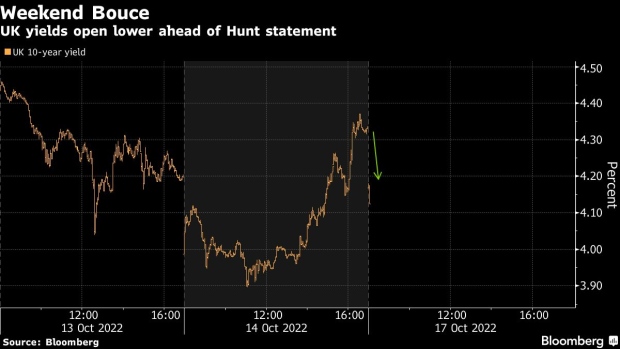Oct 17, 2022
UK Bonds Surge as Traders Bet on Further U-Turns on Fiscal Plan
, Bloomberg News

(Bloomberg) -- The UK bond market’s nascent recovery is littered with potential pitfalls despite the government’s U-Turn on vast fiscal stimulus.
Investors are still watching out for the medium-term fiscal plan at the end of the month, which will offer much-needed clarity on looming gilt supply. Also, the extent of further Bank of England rate hikes is not clearly outlined and the ongoing deleveraging from pension fund strategies culd exacerbate volatility in long-dated gilts -- an unhealthy mix for a market designed to move slowly and steadily.
It will likely take time for many investors to increase exposure to UK debt with much confidence strategists say. Even after Monday’s huge rally, yields ended the day around multi-year highs, volumes were muted and volatility near record highs. It speaks, market participants say, to the lasting damage of Prime Minister Liz Truss’ attempt to boost growth at the expense of fiscal discipline.
“There still remains this risk premium that has been built up in the gilt market due to this fiscal uncertainty,” said Laureline Chatelain, fixed-income strategist at Pictet Wealth Management. “We expect much volatility and higher gilt yields for some months to come, until this credibility is rebuilt.”
Newly-appointed Chancellor of the Exchequer Jeremy Hunt on Monday scrapped a number of tax-cut proposals and signaled consumers would shoulder more of the increase in energy prices from next April. It was the latest of U-Turns from the initial mini-budget proposal on Sept. 23 that sent shock-waves through the market.
The yield on 30-year gilts fell as much as 47 basis points to 4.32%, and posted the second biggest drop on record on a closing basis. Inflation-linked bonds rallied even more. The pound outperformed other Group-of-10 peers Monday, rising 1.6% to $1.1349.
Already though, investors are beginning to question how much further the rally can go.
“Today’s gilt rally has pushed their valuation back towards the expensive side,” said Jon Day, global bond portfolio manager at Newton Investment Management. “Sticky inflation and large current and fiscal deficits means yields will need to stay high -- and sterling lower -- to attract international capital.”
Meanwhile, the very future of Truss’ premiership is starting to come under question. That’s a potential minefield for traders over the coming weeks as they try to gauge which of the government’s policies will be lasting.
Hunt Drops What’s Left of Truss Plan to Save UK Credibility
Markets will be weighing “the point of the PM right now if everything she has attacked since she came to power is now being enacted,” said Geoff Yu, a strategist at BNY Mellon. “That’s where the credibility issue comes in.”
Mammoth Rally
Volumes in UK 10-year government bond futures was one-third of the 560,879 contracts set on Sept. 28 when the BOE intervened in the wake of the mini-budget. Realised volatility on 10-year bond futures rose Monday toward the record high set earlier this month.
Traders also pared bets on BOE rate hikes, as a reduced stimulus package takes the pressure off the central bank to tighten more aggressively. Money market wagers show the rate peaking at around 5.25% in 2023, the lowest level since the announcement of the mini-budget on Sept. 23.
It is still unclear to what extent LDI funds, whose collateral calls exacerbated the bond market sell-off, have been able to build up buffers to protect against further spikes in gilt yields. That could render them vulnerable if market sentiment swings the other way.
Hedge Fund Titan Warns UK Pension Crisis Is Just the Start
The behavior of these funds can also act as a weight on gilt demand, according to Chris Arcari, head of capital markets at Hymans Robertson. These funds, used by pension schemes to hedge against interest-rate risk, eventually prompted the BOE to intervene in the gilt market.
“Even if yields stop rising, or fall, schemes are still in the process of deleveraging as they, and their LDI managers, adopt more prudent targets,” he said.
Liquidity Pressure
Another key question is whether the BOE will go ahead with the planned active sales of gilts it accumulated under quantitative easing, which have already been postponed to Oct. 31.
The BOE’s emergency bond-buying operations have now ended, though its temporary expanded collateral repo facility -- aimed at enabling banks to help ease liquidity pressures on LDI funds -- will remain available until Nov. 10. The central bank said it intends to resume sales of corporate bonds in the week beginning Oct. 24 in a statement Monday.
“What we need to see is a period of stabilization and lower volatility to continue to ease pressure on pension funds and help to restore confidence for buyers of gilts to gradually return,” said Daniela Russell, rates strategist at HSBC Holdings. “Time will tell whether that can be achieved against a very uncertain political outlook.”
(Updates pound price in sixth paragraph.)
©2022 Bloomberg L.P.





